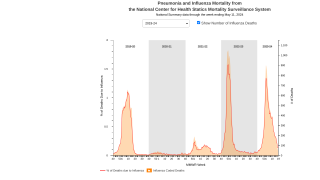Southern Hemisphere Flu Season Fizzled Out Before Starting

According to the World Health Organization (WHO), influenza activity was reported at lower levels than expected for this time of the year.
As an example, in the temperate zones of the Southern Hemisphere, the influenza season has not started. Despite continued or even increased testing for influenza in some countries in the southern hemisphere, very few influenza detections were reported, reported the WHO on September 14, 2020.
However, the WHO says ‘the current influenza surveillance data should be interpreted with caution as the ongoing COVID-19 pandemic has influenced to varying extents health-seeking behaviors in the Member States.
And, the various hygiene and physical distancing measures implemented by Member States to reduce SARS-CoV-2 virus transmission have likely played a role in reducing influenza virus transmission.
Based on data as of September 1, 2020, the WHO reported the following highlights:
In the Caribbean and Central American countries, no influenza detections were reported.
In tropical South America, tropical Africa, and Southern Asia there were sporadic or no influenza detections across reporting countries.
In South East Asia, influenza A(H3N2) virus detections were reported in Cambodia.
Furthermore, of the very low numbers of detections reported, seasonal influenza A viruses accounted for the majority of detections worldwide.
The WHO’s laboratories tested specimens during the recent reporting time period: 34 were positive for influenza viruses, of which 19 (55.9%) were typed as influenza A and 15 (44.1%) as influenza B.
Of the sub-typed influenza A viruses, 11 (100%) were influenza A(H3N2).
And of the characterized B viruses, 3 (37.5%) belonged to the B-Yamagata lineage and 5 (62.5%) to the B-Victoria lineage.
The WHO’s summaries of global surveillance are based on data gathered through global and regional data-sharing platforms and direct reports from Member States.
‘Vaccination is the most effective way to prevent infection and severe outcomes caused by influenza viruses’ states the WHO. Moreover, selecting the most relevant influenza vaccines for the next flu season requires long term planning.
On September 16, 2020, the WHO announced its periodic review and update of viruses contained in influenza vaccines in order for the vaccines to be effective due to the constant evolving nature of influenza viruses, especially those circulating and infecting humans.
Twice annually, the WHO organizes consultations with an advisory group of experts to analyze influenza virus surveillance data generated by the WHO Global Influenza Surveillance and Response System, and issues recommendations on the composition of the influenza vaccines for the following influenza season. These recommendations are used by the national vaccine regulatory agencies and the pharmaceutical companies to develop, produce, and license influenza vaccines.
A list of U.S. FDA authorized influenza vaccines for the 2020-2021 flu season are published at PrecisionVaccinations.
Vax-Before-Travel publishes research-based, healthy travel news.
Our Trust Standards: Medical Advisory Committee

























